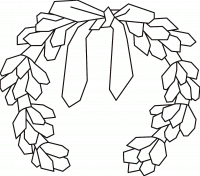
Spring 2023
(Jump to Fall 2022)
Primarily for Undergraduates
ARCH 0320 Somewhere Back in Time: Archaeology, the Ancient World, and Heavy Metal Music [CRN: 27678]
Iron Maiden’s “Alexander the Great”, Ex Deo’s “The Rise of Hannibal”, Septic Flesh’s “Prometheus” – few musical genres are as interested in history as heavy metal. 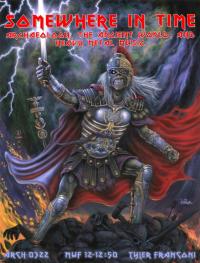 The sounds, lyrics, images, films, and live performances of many bands from around the world center on stories and mythologies from past cultures. This class examines these phenomena from an archaeological and historical point of view, centering discussion on the music and its stories while contextualizing these modern elements within an archaeologically and historically accurate past. Instructor: Tyler Franconi. MWF 12pm-12:50pm.
The sounds, lyrics, images, films, and live performances of many bands from around the world center on stories and mythologies from past cultures. This class examines these phenomena from an archaeological and historical point of view, centering discussion on the music and its stories while contextualizing these modern elements within an archaeologically and historically accurate past. Instructor: Tyler Franconi. MWF 12pm-12:50pm.
ARCH 0763 The Private Life of the Privy: A Secret History of Toilets [CRN: 27480]
It’s usually unspoken, but we all know the truth: everybody poops. This class starts with some basic questions: what is poo; what are toilets, cesspits, and latrines; and how have these changed over time. But where we go, what "equipment" we use, what goes into the loo, and the morals and ideals imbued in that act vary vastly between cultures – touching on complex questions of gender, religion, disease, technology, and science. Combining advanced scientific approaches with material and cultural analyses, this course will demonstrate that even a seemingly simple biological act can reveal a culture’s most fundamental secrets. Instructor: Zachary Dunseth. MWF 2pm-2:50pm.
ARCH 0770 Archaeology of Eating and Drinking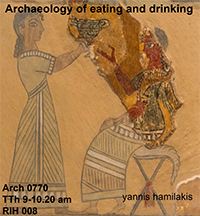 [CRN: 26760]
[CRN: 26760]
Everybody eats -- but patterns of eating and drinking vary dramatically from culture to culture. This course will examine the social roles and meanings of eating and drinking from prehistory to the present, using case studies from the Mediterranean and other parts of the world. How are identity, gender, and power negotiated through food and drink? What are the roles of the body, the senses, and memory? What does a history of humanity look like from the point of view of the consuming body? FYS. Instructor: Yannis Hamilakis. TTh 9am-10:20am.
ARCH 0755 Engineering and Technology in the Ancient World [CRN: 27914]
Enter the world of Greek and Roman engineers whose monumental works and technologies impressed audiences, both ancient and modern. 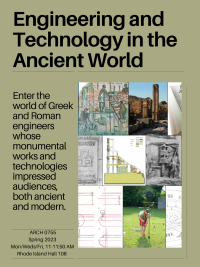 Explore the technologies of art and construction that led to some of the most extensive building programs undertaken by pre-modern states. Through case studies ranging from particular structural elements and technologies (e.g. columns, domes, cranes, catapults) to overall structural systems (palatial complexes, temples, infrastructure), this class investigates the history of materials, methods, and knowledge behind ancient innovations, and the role of art, architecture, and engineering in shaping socio-cultural and political identity. Instructor: Amanda Gaggioli. MWF 11am-11:50am.
Explore the technologies of art and construction that led to some of the most extensive building programs undertaken by pre-modern states. Through case studies ranging from particular structural elements and technologies (e.g. columns, domes, cranes, catapults) to overall structural systems (palatial complexes, temples, infrastructure), this class investigates the history of materials, methods, and knowledge behind ancient innovations, and the role of art, architecture, and engineering in shaping socio-cultural and political identity. Instructor: Amanda Gaggioli. MWF 11am-11:50am.
For Undergraduates and Graduates
ARCH 1155 Cities, Colonies and Global Networks in the Western Mediterranean [CRN: 26504]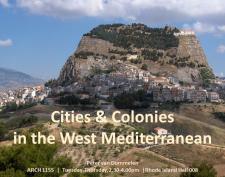
How did cities develop? This course will explore the connections between colonialism and urbanism in the West Mediterranean of the first millennium BCE. Should we see the profound changes in Iron Age societies of the western Mediterranean primarily as a response to external contacts and colonial interference, or did they represent long-term indigenous developments? How can we understand regions where urban development was much more limited or absent? Instructor: Peter van Dommelen. TTh 2:30pm-3:50pm.
ARCH 1162 Anthropology in/of the Museum (ANTH 1901) [CRN: 25454]
Interested students must register for ANTH 1901.
This course will provide an introduction to the history, purposes, transformations, and internal workings of museums from an anthropological perspective. Students will learn about museums that focus on natural and cultural history related to anthropological studies of archaeology, human evolution, and world ethnography. It will cover the relevance of anthropological training to careers in the museum field, as well as the importance of conducting anthropological investigations in the museum environment. Enrollment limited to 20. Instructor: Christina Hodge. F 3pm-5:30pm.
ARCH 1235 Vertical Civilization: South American Archaeology from Monte Verde to the Inkas (ANTH 1505) [CRN: 26162]
Interested students must register for ANTH 1505.
This course offers an introduction to the archaeology of indigenous south American Civilizations, from the peopling of the continent around 13,000 years ago, to the Spanish Invasion of the 16th Century C.E. Throughout, we seek to understand the often unique solutions that South America indigenous peoples developed to deal with risk and to make sense of the world around them. Course lectures and discussions focus on recent research and major debates. Weekly sections draw on viewings of artifacts and manuscripts from the Haffenreffer Museum and the John Carter Brown Library. RPP. Instructor: Parker VanValkenburgh. TTh 10:30am-11:50am.
ARCH 1282 Mediterranean Culture Wars: Archaic Greek History, c. 1200 to 479 BC (CLAS 1210) [CRN: 26348]
Interested students must register for CLAS 1210.
From the end of the Bronze Age to the end of the Persian Wars is a period of considerable change in the Mediterranean and beyond. The Greek polis challenges the powers of the ancient Near East. Over seven centuries we meet Greek writing, Homeric epic, and the first historian (Herodotus). But the Greek world lay on the edges of the Ancient Near East and this course tries to offer a more balanced approach than the typically Hellenocentric perspective of the standard textbooks. CLAS 1210 addresses political, social and economic history. Literary, epigraphical and archaeological cultures provide the evidence. Instructor: Graham Oliver. MWF 2pm-2:50pm.
ARCH 1434 Jerusalem: Jews, Christians, Muslims (UNIV 1003) [CRN: 25159]
Interested students must register for UNIV 1003.
In this course, we will examine how competing heritage narratives of the city of Jerusalem have been shaped by Jewish, Christian, and Muslim histories and beliefs, as well as by Israeli, Palestinian, and international views and interests. We will explore the impact of media portrayal, educational platforms, and archaeological explorations in the contexts of social, religious, and political debates from the mid-nineteenth century to the present. At the focus will be the question of the city’s indivisible heritage and boundaries that divide the city and its communities. Instructor: Katharina Galor. TTh 6:40pm-8pm.
ARCH 1487 Environmental History of East Asia (HIST 1820B) [CRN: 25627]
Interested students must register for HIST 1820B.
With a fifth of the world’s population on a twentieth of its land, the ecosystems of China, Japan, Korea and Vietnam have been thoroughly transformed by human activity. This course will explore the human impact on the environment from the first farmers to the industrial present, exploring how wildlife was eliminated by the spread of agriculture, how states colonized the subcontinent, how people rebuilt water systems, and how modern communism and capitalism have accelerated environmental change. Each week we will examine primary sources like paintings, essays, maps and poems. The course assumes no background in Asian or environmental history. Instructor: Brian Lander. TTh 10:30am-11:50am.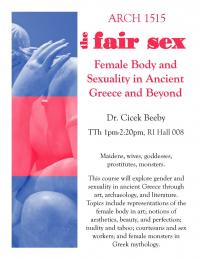
ARCH 1520 The Fair Sex: Female Body and Sexuality in Ancient Greece and Beyond [CRN: 27967]
Maidens, wives, goddesses, prostitutes, monsters. This course will explore gender and sexuality in ancient Greece through art, archaeology, and literature. Topics include representations of the female body in art; notions of aesthetics, beauty, and perfection; nudity and taboo; emotions; burial practices; tropes of femininity; zones of female agency and authority, such as funerals and festivals; notions of bodily decorum and clothing; archaeological evidence for women’s presence in domestic and public spaces; sexual violence in Greek art and literature, and multiply marginalized women (immigrants, enslaved workers). Instructor: Cicek Beeby. TTh 1pm-2:20pm.
ARCH 1543 Decolonizing Classical Antiquity: White Nationalism, Colonialism, and Ancient Material Heritage (MGRK 1220) [CRN: 26378]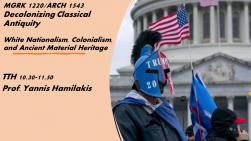
Interested students must register for MGRK 1220.
Why do the material remnants of classical antiquity still attract public attention and exercise symbolic power? Why have such monuments been "used" by authorities and diverse social groups in the service of often totalitarian agendas? What are the cases where these monuments operate as weapons for resistance? How has colonial, racial, and national modernity shaped the way we understand and experience the materiality of the classical? Finally, how can we decolonise classical antiquity? We will use a diversity of global case studies, including modern Greece and Europe, and a variety of sources, from ethnographically derived performances to digital culture. Instructor: Yannis Hamilakis. TTh 10:30am-11:50am.
ARCH 1604 Borderlands: Art and Culture between Rome and Iran (HIAA 1432) [CRN: 27540]
Interested students must register for HIAA 1432.
We tend to think of borders as hard and fast lines on a map, separating two distinct spheres of territory under different political authorities. In the ancient world however, borders formed regions of uncertain control, places defined by zones of influence projected from cities, with authorities and actors adept at playing both sides. This was especially true in the Classical and Late Antique Middle East, a region contested by the great empires of Rome and Iran. This class examines the art and architecture produced both by and between Rome and Iran. By studying the depictions (and appropriations) of the other, and the visual and material record of liminal places such as Palmyra, Commagene, Hatra, and Dura-Europos, this course investigates the forms of cultural expression in contested places, and how they forged an international visual language of power, prestige, and sacrality. Instructor: Breton Langendorfer. W 1pm-3:30pm.
ARCH 1636 Collapse! Ancient Egypt after the Pyramid Age (EGYT 1030) [CRN: 27346]
Interested students must register for EGYT 1030.
How does a civilization or a kingdom collapse after building some of the most enduring monuments from the ancient world? What happens in Egypt after the Pyramid Age? This course uses texts, objects, and monuments to delve into the history and archaeology of the Late Old Kingdom up to the beginning of the Middle Kingdom in Egypt (c. 2160–2055 BCE), often described as a Dark Age characterized by chaos, decline, and natural disasters. We will discuss how ancient history is written with a particular focus on the narrative of collapse in ancient cultures. The class will be based on presentations and discussions focused on controversies linked to the following topics: politics; kings, kinglets, and rulers; monuments and funerary architecture; climate change; religion and beliefs; (auto-)biographies; literature; and art. There are no prerequisites. Instructor: Christelle Alvarez. MWF 11am-11:50am.
ARCH 1772 The Human Skeleton (ANTH 1720) [CRN: 26717]
Interested students must register for ANTH 1720.
More than simply a tissue within our bodies, the human skeleton is gateway into narratives of the past--from the evolution of our species to the biography of individual past lives. Through lecture and hands-on laboratory, students will learn the complete anatomy of the human skeleton, with an emphasis on the human skeleton in functional and evolutionary perspective. We will also explore forensic and bioarchaeological approaches to the skeleton. By the course conclusion, students will be able to conduct basic skeletal analysis and will be prepared for more advanced studies of the skeleton from medical, forensic, archaeological, and evolutionary perspectives. Enrollment limited to 20. Not open to first year students. Instructor permission required. Instructor: Rachel Kalisher. MWF 1pm-1:50pm.
ARCH 1793 Slavery in the Ancient World (CLAS 1120E) [CRN: 26353]
Interested students must register for CLAS 1120E.
Examines the institution of slavery in the ancient world, from Mesopotamia and the Near East to the great slave societies of classical Greece and (especially) imperial Rome; comparison of ancient and modern slave systems; modern views of ancient slavery from Adam Smith to Hume to Marx to M.I. Finley. Readings in English. Instructor: John Bodel. TTh 1pm-2:20pm.
ARCH 1782 Violence of the Past (ANTH 1730) [CRN: 25608]
Interested students must register for ANTH 1730.
This course is both a study of the evidence used by anthropologists, archaeologists, and historians for reconstructing patterns of war and violence in the past and also the implications for that research on contemporary peoples. Scholars continue to be pre-occupied with the question of whether war and violence has escalated or declined in modern times, often embedding their interpretations in notions of progress and the supposed success of western nation-states in curtailing violence. Less well-acknowledged is both the shakiness of the data on which such claims are made and the stereotyped perceptions they reinforce regarding the peoples subjugated by the colonial powers from which modern nation-states descend. We will consider both foundational tests and recent scholarship regarding the anthropological, archaeological, and historical evidence for violence in the human past while critically examining how that research is consumed in popular discourse. Instructor: Andrew Scherer. W 9am-11:30am.
ARCH 1852 Material Culture Practicum (ANTH 1621) [CRN: 26549]
Interested students must register for ANTH 1621.
Combines theory with hands-on study of material culture in historical archaeology. Students gain skills and experience in identifying, dating, recording, analyzing, and interpreting artifacts and conduct individual or team research projects. Enrollment limited to 15. Instructor: Patricia Rubertone. W 3pm-5:30pm.
Primarily for Graduates
ARCH 2101 Material Matters (ANTH 2515) [CRN: 26592]
Interested students must register for ANTH 2515.
In the past decade there has been a growing interest in the study of material culture as an explicitly interdisciplinary endeavor involving the fields of anthropology, archaeology, art history, literary theory, museum studies, and philosophy, among many others. These perspectives exhibit a range of approaches to interrogating how people make things, how things make people, how objects mediate social relationships, and how inanimate objects can be argued as having a form of agency. This graduate seminar is designed to encourage reflection upon material culture and its influence in shaping our lives. Instructor: Robert Preucel. F 3pm-5:30pm.
ARCH 2610 From Hilltop to Caput Mundi: The Archaeology of the Roman World [CRN: 27795]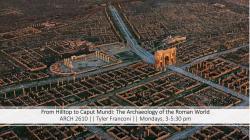
From an iron age village atop a hill overlooking the Tiber to the largest land empire prior to the Mongols of the 13th century, Rome has a deep and storied past. This class examines the current methods, theories, and major debates in Roman archaeology. We especially focus on material from outside the city of Rome and emphasize the geographical and chronological breadth of the Roman Empire. Topics may include colonialism, imperialism, Romanization, settlement, economy, religion, environmental change, violence, technology, and military life. Instructor: Tyler Franconi. M 3pm-5:30pm.
ARCH 2622 Roman Topography (CLAS 2010B) [CRN: 26358]
Interested students must register for CLAS 2010B.
That actions occur in place is obvious, but how does place define action, and how do actions define place? How does the accretion of meanings assigned to a place through repeated use provide significance to the current actions, affect reinterpretations of past events, and effect future uses? Topography explores not only the history of monuments but also the constellation of meanings shaped by the interaction of monuments with each other in the cultural landscape. Topographical relationships serve as an imprint of a particular community's social, political, economic, and religious behavior within and across space and time. Ancient Roman case studies. Instructor: Amy Russell. W 3pm-5:30pm
Fall 2022
(Jump to Spring 2023)
Primarily for Undergraduates
ARCH 0100 Field Archaeology in the Ancient World [CRN: 18135]
Interested students can register for either ARCH 0100 or ANTH 0500.
Always wanted to be Indiana Jones? This course, focusing on the Mediterranean world and its neighbors in antiquity, interprets field archaeology in its broadest sense. In addition to exploring “how to do” archaeology – the techniques of locating, retrieving and analyzing ancient remains – we will consider how the nature of these methodologies affects our understanding of the past. Instructors: Laurel Bestock and Parker Van Valkenburgh. MWF 10pm-10:50am.
ARCH 0161 Arts of Asia: Beginnings to 1300 (HIAA 0024) [CRN: 18094]
Interested students must register for HIAA 0024.
This course surveys the history of art in Asia from the earliest times through the Mongol Empire. Organized around a series of exemplary objects, the course explores the temporal, geographic, material, and thematic range of early Asian art through the life stories of individual things. Tracing histories of human ingenuity and value, we will examine the ways these things changed the people who saw them and were themselves changed in the process of being seen. And we will come to know them through the ways they change us. Instructor: Jeffrey Moser. TTh 10:30am-11:50am.
New! ARCH 0270 Troy Rocks! Archaeology of an Epic [CRN: 18964]
What do Brad Pitt, Julius Caesar, Dante, Alexander the Great, and countless sports teams have in common? The Trojan War! This course will explore the Trojan War not only through the archaeology, art, and mythology of the Greeks and Romans but also through the popular imaginings of cultures ever since, to figure out what "really" happened when Helen ran off and Achilles got angry and the Greeks came bearing gifts. Instructor: Amanda Gaggioli. TTh 9:00am-10:20am.
ARCH 0407 Hadrian's Wall: Soldiers and Civilians on Rome's Northern Frontier [CRN: 18137] [Course Website]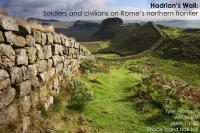
Explore the archaeology of one of Great Britain’s grandest monuments, Hadrian’s Wall, and follow its path through the history and archaeology of Roman Britain. Using the fortification as both inspiration and guide, students will learn about the life on Rome’s northern frontier, from Rome’s first occupation in the Iron Age to Roman withdrawal centuries later. The wall’s symbolic and real impact will illuminate the tangible ways archaeology can teach us about religion, race, the military, politics, art, architecture, and the everyday lives of people in one of Rome's most distant provinces. Instructor: Tyler Franconi. MWF 11am-11:50am.
Canceled: ARCH 0440 Archaeologies of the Ancient "Middle East"
To understand the tensions of the modern Middle East, it is necessary to understand the region's past. This course will explore the archaeological history of Israel, Lebanon, Syria, and Jordan – not least the political and religious agendas that scholars have brought to the study of these lands. Prehistoric and early historic developments will be emphasized: the earliest human occupation, the origins of cultivation and pastoralism, orientalism, (post-)colonialism, cultural memory, and the rise of social inequality and political complexity. Instructor: Nour Munawar. MWF 2pm-2:50pm.
ANTH 0500 Past Forward: Discovering Anthropological Archaeology [CRN: 16998]
Interested students can register for either ARCH 0100 or ANTH 0500.
This course offers a broad journey through the human past, from material culture crafted by our evolutionary ancestors to the remnants of the recent historic past. To facilitate this journey, the class explores the methods, concepts, and theories that anthropologists employ in the study of past peoples, places, and things. Case studies stretch across the globe. As a hands-on endeavor, archaeology focuses on tangible evidence. In this course, small-group discussion, laboratory, and field exercises will complement lectures, leading to an understanding of how anthropologists study the past and how that knowledge affects the present. LILE. Instructors: Parker Van Valkenburgh and Laurel Bestock. MWF 10am-10:50am.
For Undergraduates and Graduates
ARCH 1054 Indians, Colonists, and Africans in New England (ANTH 1624) [CRN: 17003]
Interested students must register for ANTH 1624.
The course explores the colonial and capitalist transformation of New England's social and cultural landscapes following European contact. Using archaeology as critical evidence, we will examine claims about conquest, Indian Extinction, and class, gender and race relations by studying the daily lives and interactions of the area's diverse Native American, African American, and European peoples. Instructor: Patricia Rubertone. TTh 10:30am-11:50am.
ARCH 1242 Amazonia from the Prehuman to the Present (HIST 1360) [CRN: 17710]
Interested students must register for HIST 1360.
This course merging lecture and discussions will examine the fascinating and contested history of one of the world’s most complex fluvial ecosystems: Amazonia, in equatorial South America, from its pre-human history to the present day. The course will include readings and discussions on the region’s ecological origins; the social history of its diverse Indigenous and immigrant populations, including African-descended peoples; exploration myths and European colonial projects; and more recent efforts to exploit and protect Amazonia’s extraordinary natural and human resources. The course will use tools and resources from archaeology, anthropology, biology, and social and cultural history, and will also examine popular representations of the Amazon through novels, newspapers, podcasts, and film. Instructor: Neil Safier. MWF 1pm-1:50pm.
ARCH 1500 Classical Art from Ruins to RISD: Ancient Objects/Modern Issues [CRN: 18298]
Our class will use RISD Museum’s ancient Greek and Roman collection as a framework to discuss art history, museum studies, heritage management, and world affairs. We will move beyond the pleasing aesthetics of classical art to grasp the objects’ social and cultural contexts, and their role in structures of power, privilege, and colonialism – particularly examining issues of race, class, gender, sexuality, migration, and cross-cultural contact. What are the ethical responsibilities of museums – and universities – within this discourse? Instructor: Cicek Beeby. TTh 2:30pm-3:50pm.
ARCH 1544 Heritage in the Metropolis: Remembering and Preserving the Urban Past (URBN 1871A) [CRN: 16523]
Interested students must register for URBN 1871A.
Urban heritage – from archaeological sites and historic architecture to longstanding cultural practices – is increasingly threatened by the exponential growth of cities around the globe. Most critically, the complex histories and lived experiences of the diverse communities who have inhabited and shaped cities are often in danger of being erased and forgotten today. This course examines how we might remember and preserve this urban past – and the tangible sites and artifacts that attest to it – in light of the social and political dynamics of cities in the present. Instructor: Lauren Yapp. W 3pm-5:30pm.
ARCH 1622 Art, Secrecy, and Invisibility in Ancient Egypt [CRN: 18320]
Ancient Egypt is well known for having produced large and eminently visible art and architecture. But a persistent theme in Egyptian visual culture is that of invisibility, of art made and then deliberately hidden or destroyed. The range of examples is vast and varied, suggesting a complex relationship between visibility and meaning. This seminar will explore how unseeable art intersects with themes of audience, agency, and time in ancient Egypt, utilizing examples from other cultures - including our own - to examine the meanings of the invisible. Instructor: Laurel Bestock. F 3pm-5:30pm.
ARCH 1713 Architectural Reuse: The Appropriation of the Past (HIAA 1440F) [CRN: 17325]
Interested students must register for HIAA 1440F.
This seminar will consider the survival, revival and adaptive reuse of older objects, texts and built spaces in the visual and material culture of successor cultures. We will look critically at the literature on the archaeology of memory, “Renaissance and revival” spolia studies and adaptive reuse. The seminar will examine selected case studies, including the reuse of sculptural elements in the Arch of Constantine, the conversion of Pantheon into a church and Hagia Sophia into a mosque, appropriated elements in the Qutb mosque in Delhi and the adaptation of the Bankside Power Station as the Tate Gallery. Instructor: Sheila Bonde. F 3pm-5:30pm.
ARCH 1772 The Human Skeleton (ANTH 1720) [CRN: 17002]
Interested students must register for ANTH 1720.
More than simply a tissue within our bodies, the human skeleton is gateway into narratives of the past--from the evolution of our species to the biography of individual past lives. Through lecture and hands-on laboratory, students will learn the complete anatomy of the human skeleton, with an emphasis on the human skeleton in functional and evolutionary perspective. We will also explore forensic and bioarchaeological approaches to the skeleton. By the course conclusion, students will be able to conduct basic skeletal analysis and will be prepared for more advanced studies of the skeleton from medical, forensic, archaeological, and evolutionary perspectives. Enrollment limited to 20. Not open to first year students. Instructor permission required. Instructor: Andrew Scherer. MWF 9am-9:50am.
ARCH 1822 Anthropology of Place (ANTH 1910B) [CRN: 17006]
Interested students must register for ANTH 1910B.
The anthropology of place serves as a unifying theme for the seminar by bridging anthropology’s subdisciplines and articulating with other fields of knowledge. Through readings and discussion, students will explore how place permeates people’s everyday lives and their engagement with the world, and is implicit in the meanings they attach to specific locales, their struggles over them, and the longings they express for them in rapidly changing and reconfigured landscapes. Enrollment limited to 20. Instructor: Patricia Rubertone. W 3pm-5:30pm.
New! ARCH 1870 Environmental Archaeology [CRN: 19122] [Course Website]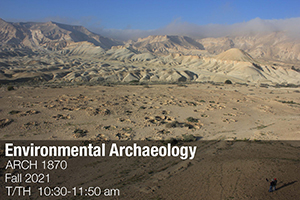
How has climate change affected the development of human society? How have people changed or destroyed their environments in the past? What does "sustainability" mean over the long term? Environmental archaeology is the study of these questions and more through the use of scientific techniques to analyze soils, plants, and animal remains from ancient archaeological contexts. A combination of class and hands-on teaching will introduce these methods and how they allow us to interpret human-environmental interactions in the past. Instructor: Zachary Dunseth. TTh 1pm-2:20pm.
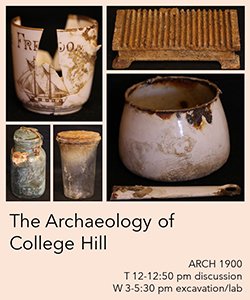 ARCH 1900 The Archaeology of College Hill [CRN: 18139] [Course Website]
ARCH 1900 The Archaeology of College Hill [CRN: 18139] [Course Website]
A training class in field and laboratory techniques. Topics include the nature of field archaeology, excavation and survey methodologies, archaeological ethics, computer technologies (such as GIS), and site and artifact analysis and conservation. Students will act as practicing archaeologists through the investigation of local historical and archaeological sites in the College Hill area (e.g. the First Baptist Church of America and the John Brown House). W 3pm-5:30pm.
Primarily for Graduates
ARCH 2006 Principles of Archaeology (ANTH 2501) [CRN: 17001]
Interested students must register for ANTH 2501.
Examines theoretical and methodological issues in anthropological archaeology. Attention is given to past concerns, current debates, and future directions of archaeology in the social sciences. Instructor: Parker VanValkenburg. M 3pm-5:30pm.
ARCH 2157 Subaltern Communities: Archaeological Perspectives Beyond Domination and Resistance [CRN: 18528]
Mediterranean (pre)history is usually cast in terms of an inexorable rise of state domination and colonial exploitation under the euphemistic label of ‘social complexity’. This seminar will examine and highlight the role of ‘people without history’ not by simply pitching them as rebels against dominant powers but by exploring the subtle and manifold connections that interweave subaltern communities with hegemonic groups. Instructor: Peter van Dommelen. Th 4pm-6:30pm.
ARCH 2263 Geoaesthetics and the Environmental Humanities (HIAA 2215) [CRN: 17882]
Interested students must register for HIAA 2215.
This seminar critically examines recent formulations of “the planetary” in the environmental humanities. Proceeding from close examination of historically-specific artistic practices, ranging from the medieval sculpture of China’s “Mountain that Flew” to the land art of the 1960s, it excavates the predispositions and assumptions embodied in particular “geoaesthetics,” and situates these aesthetics in the long history of human efforts to transcend the temporal and spatial scale of the human body. Moving from the “climatic artistry” of the medieval Deccan and the thinking forests of the Amazonian Runa to the formation of modern geological science and the creation of the metric system, it considers the challenge of a deep history of geoaesthetics to contemporary theorizations of hyperobjects, planetarity, and the Anthropocene. Instructor: Jeffrey Moser. Th 4pm-6:30pm.
ARCH 2303 The Ancient Near East: Early Modern Intellectual Histories (ASYR 2100) [CRN: 18339]
Interested students should register for ASYR 2100.
This course explores how the early modern study of the ancient Near East took shape, paying particular attention to relevant debates from the 17th to the 19th centuries. Students will engage in thorough analysis of topics such as the history of decipherment of cuneiform; the development of systematic archaeological excavation; the rise of historical linguistics; debates about the historical value of classical Greek and Roman sources on the ancient Near East; the entanglement of European imperialist projects beyond Europe and the expansion of first-hand knowledge about Mesopotamia; the role of local collaborators in the production of academic knowledge; the place of non-western cultures in European constructions of ancient history; etc. The course is primarily aimed at graduate students (or advanced undergraduates) interested in the history and archaeology of the region in antiquity and/or early modern intellectual history. Instructors: John Steele and Felipe Rojas. M 3pm-5:30pm.
Additional Course Information
You may also visit Courses@Brown listings for up-to-date information on courses and room assignments. Check under: Area of Study: "Archaeology and the Ancient World”
For a listing of all courses ever taught in Archaeology and the Ancient World (or in Old World Archaeology, its predecessor), please visit the "All Courses" page on this website. To browse the web pages and Canvas sites -- including syllabi -- for most ARCH courses, please see our "Course Websites" page.
